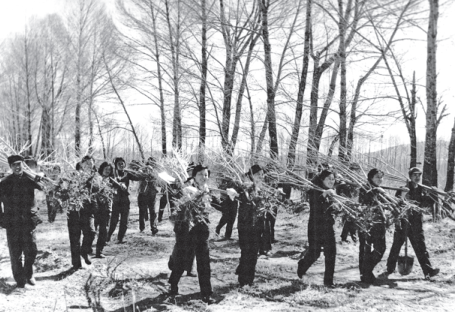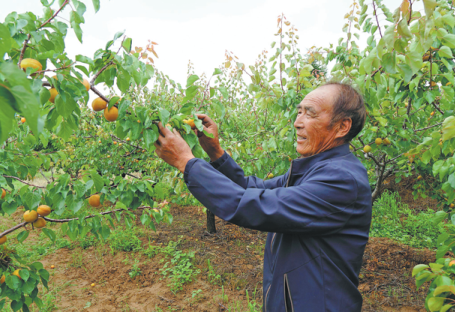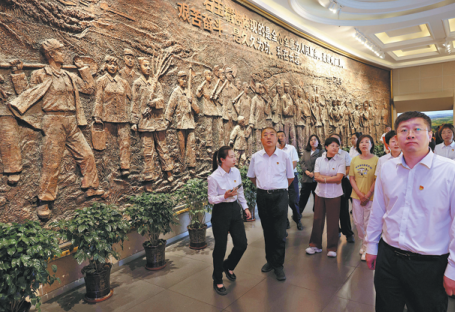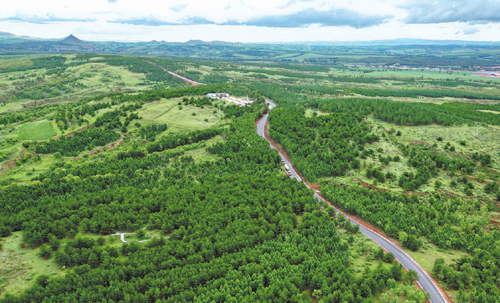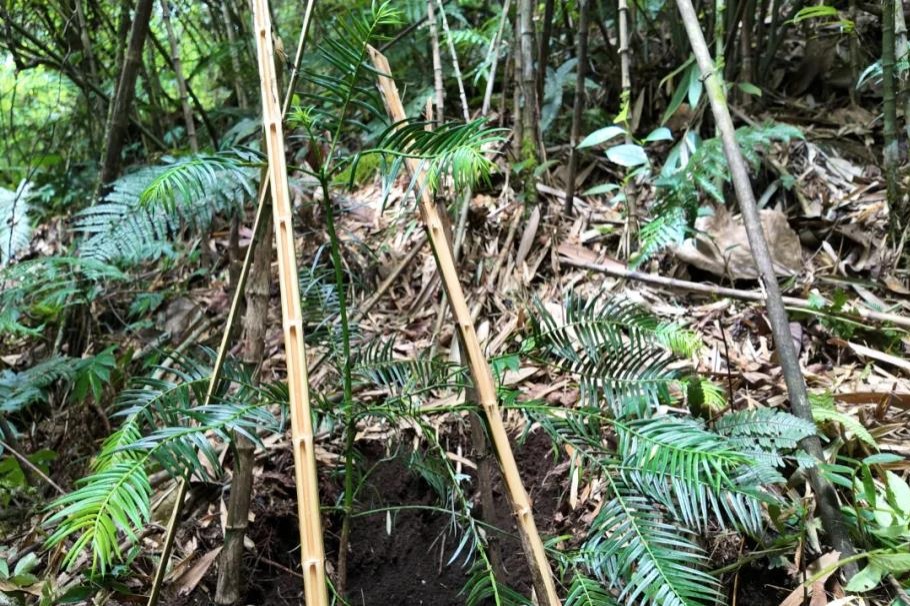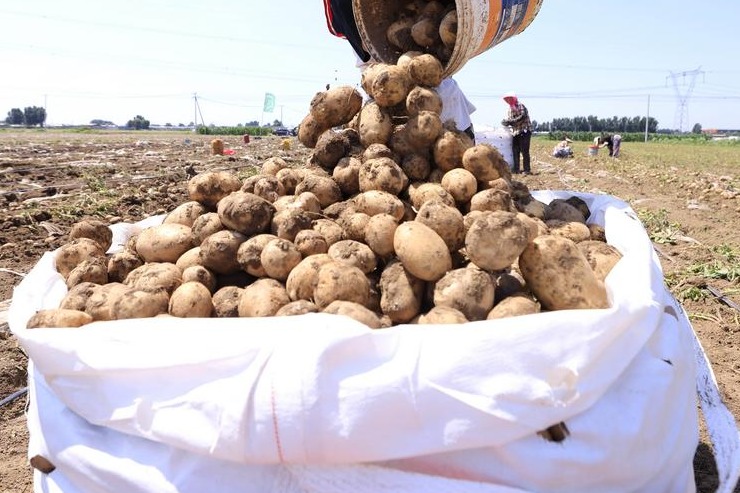Afforestation turns barren ravine into green oasis
'Youyu spirit' helps battle desertification, restore ecology

For over 40 years, Wang Zhanfeng had rooted himself in the barren mountains of Youyu county in the northern province of Shanxi. Starting from the challenging task of planting the first sapling amid swirling yellow sands, he has now transformed over 200 hectares of land into lush woodland, significantly altering the local ecosystem.
Wang, 74, a villager from Laoqiangkuang village, bears calloused hands as evidence of his decades-long dedication.
"In my childhood, we had to cover our bowls while eating, otherwise they would be filled with sand," Wang told China Daily. Villagers had to wear windproof goggles and sand masks when venturing outside. During the worst winds, they had to light lamps indoors during the day.
Youyu is situated less than 100 kilometers from the Mu Us Desert spreading between the Inner Mongolia autonomous region and Shaanxi province, positioned in a natural wind corridor where the Siberian cold air moves southward.
In the early years of New China, the county faced severe environmental conditions with extensive land desertification and extremely low plant survival rates. It was once deemed by international environmental experts as one of the "least suitable areas for human habitation", prompting suggestions for the relocation of the entire county.
However, the locals were determined to make a change.
Wang's grandfather and father had shouldered shovels to plant trees voluntarily. In the 1980s, upon hearing that his hometown was still battling sandstorms, he closed his hotel business and returned to the village, determined to protect the land and turn the barren slopes green.
His tree-planting endeavors faced three major challenges.
Acquiring seedlings was difficult, requiring arduous journeys over mountains to fetch them. Planting was challenging due to the semi-desert soil's inability to retain water, necessitating the laying of river mud at the bottom of pits. Survival was tough for seedlings, with an average annual precipitation of fewer than 400 millimeters, prompting the innovation of "fish-scale pits" to collect rainwater on the mountainside.
Even then, during droughts, manual watering was necessary. Local women organized water-carrying teams, joining men in hauling water from the valleys to irrigate the saplings.
Equipped with his "three treasures" — a shovel for digging holes, dried bread as food on mountains, and frostbite ointment for cracked hands — Wang would dig and plant trees in up to 50 pits a day at his peak, often leaving him too exhausted to stand straight.
"I've thought about giving up, it's too tough," Wang said. Yet, seeing newly planted saplings partially buried by sand, he couldn't help but brush off the soil and prop them upright again.
"One must not abandon halfway; trees are no different."
After numerous failed attempts, he gradually mastered the art of tree planting. After 2000, the survival rates of his trees reached 80-90 percent and now, it's close to a perfect score.
Today, green grass, Mongolian pine, pitch pine, and larch trees cover the Shipaogou area — what was once a barren ravine had transformed into his daily "green sanctuary".
Carrying scissors during his mountain patrols, he prunes crooked branches as if he is tending to his own children. "While the green hills and clear waters have taken shape, the transformation is not yet complete," he said.
Throughout history, Youyu had been a meeting point of agricultural and grassland civilizations, as well as a crucial passage for Shanxi merchants traveling to Mongolia. However, continuous wars had ravaged its ecology.
For over 70 years, Youyu had relentlessly pursued tree planting and afforestation to improve the environment. With nearly 130 million trees planted across almost 113,333 hectares, the county's forest cover surged from less than 0.3 percent to 57 percent. What was once a "barren land" had metamorphosed into a "green oasis".
In October 2024, the 19th annual session of the Global Forum on Human Settlements and the New Sustainable Cities and Human Settlements Awards ceremony took place at the United Nations Headquarters in New York.
The submission from Youyu county, detailing the "70-year practice of desert control, afforestation, and ecological restoration", clinched the New Sustainable Cities and Human Settlements Award.
Ma Zhanwen, Party secretary of Youyu, said, "Over the 70 years, Youyu's ecological civilization practice, through the diligent efforts of several generations, vividly exemplifies the 'lucid waters and lush mountains are invaluable assets' concept of green development, paving a viable path for ecological restoration and sustainable development in desertified regions."
To further promote the enduring spirit, the Youyu Spirit Exhibition Hall was established in 2013, covering an area of nearly 1,600 square meters.
Centered on the theme of transforming Youyu's landscape through afforestation, the exhibition employs various forms of media such as graphics, videos, physical displays and a 4D cinema, attracting over 500,000 visitors.
One of the most poignant items in the exhibition hall is an oil lamp shaped like an ink bottle. Next to it, photos on display showcase the stark contrast between the past scenes of yellow sandstorms and the present lush forests.
The exhibition hall's curator, Li Gongyuan, explained, "The ink bottle-shaped oil lamp and matches were essential items for children studying back then. They relied on these oil lamps for reading and learning. That scene is now a thing of the past."
Today, Youyu is vigorously nurturing forest tourism and forest health industries, establishing the largest domestic horse breeding base in operation and the largest youth football training base in North China.
Besides, they are actively developing a 1 billion yuan ($140 million) sheep industry and a 500 million yuan sea buckthorn industry chain.
Last year, the county welcomed 6.22 million visitors from home and abroad, generating tourism revenue of 3.58 billion yuan.
Wang Zhanfeng's unwavering efforts have garnered recognition from various quarters, earning him honors such as the "Shanxi Province Watershed Governance Model" and the "Shanxi Province May 1 Labor Medal" in recent years.
"Youyu people understand trees. Without afforestation, this place would have long succumbed to sandstorms," Wang said. "To me, the Youyu spirit means afforestation, and it must continue steadfastly."
